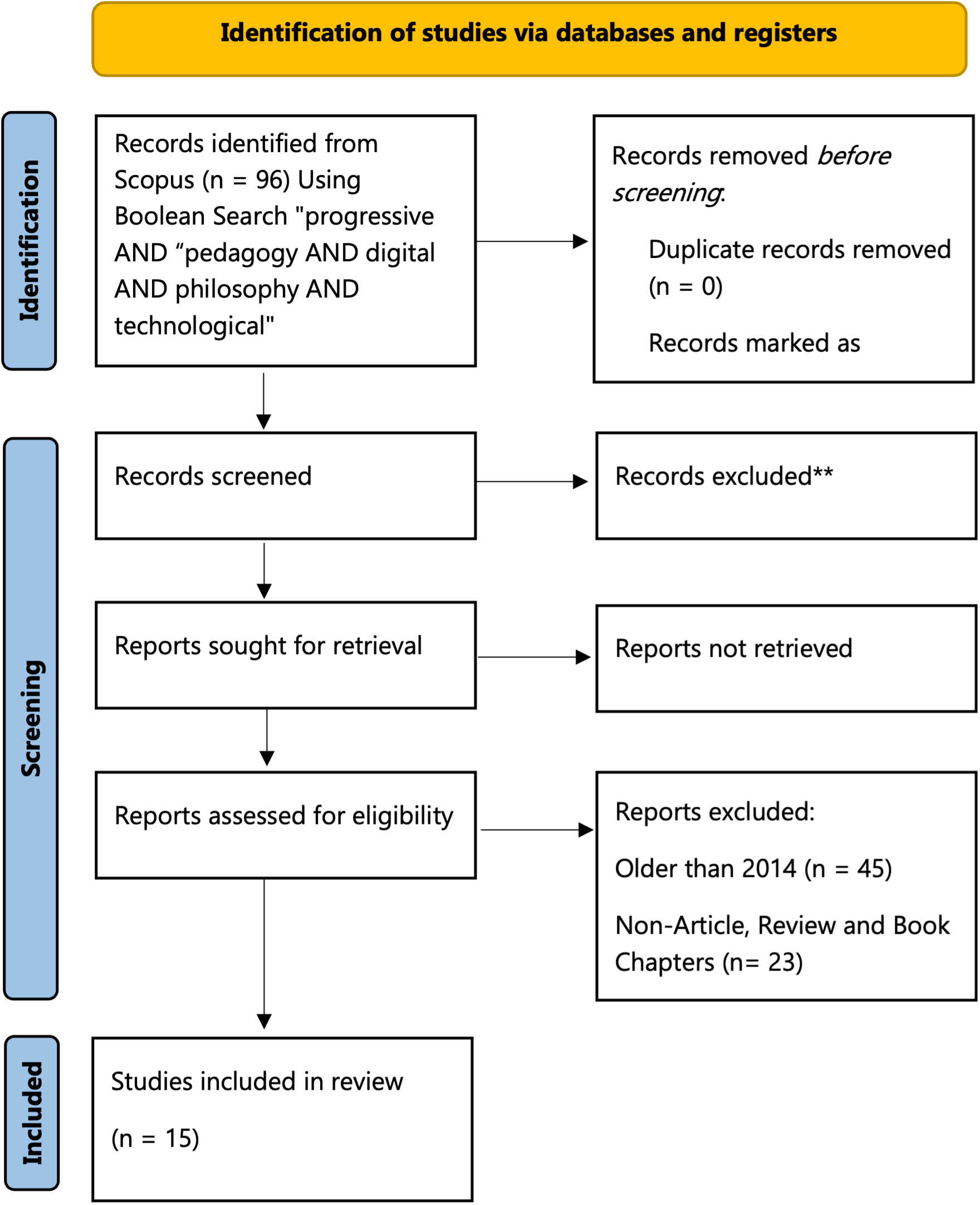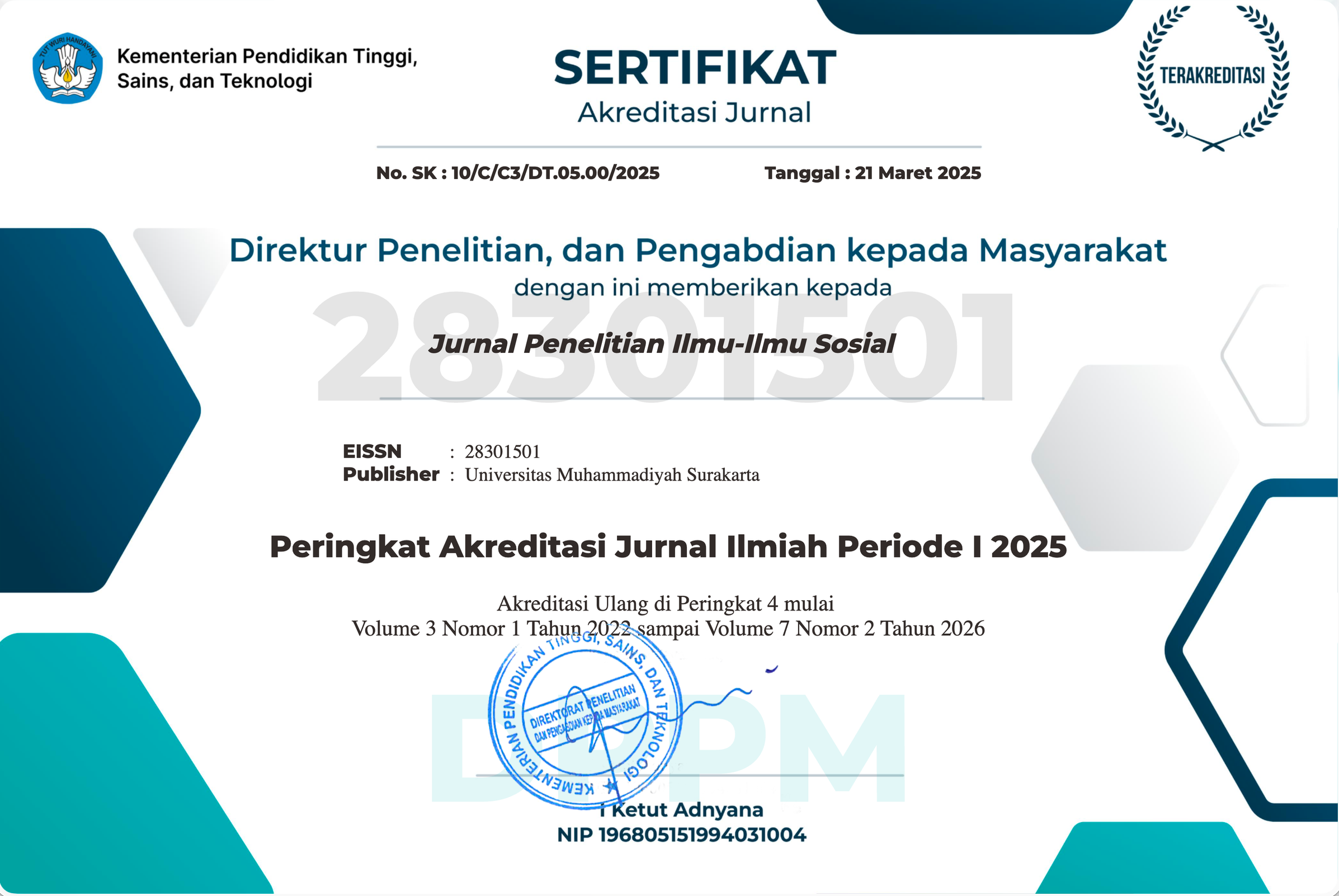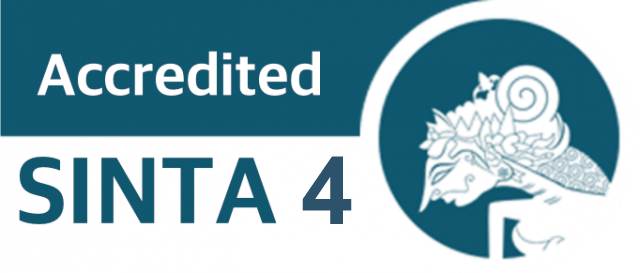Reevaluating Educational Philosophy in the Age of Technological Transformation: A Systematic Review of Progressive Pedagogies and Digital Integration
DOI:
https://doi.org/10.23917/sosial.v6i2.11813Keywords:
digital education, epistemological shifts, experiential learning, progressive pedagogyAbstract
This study presents a systematic literature review examining the intersection of progressive education and digital technology integration in contemporary learning environments. The objective is to analyze how digital tools support or challenge progressive pedagogical practices across global educational contexts. This review is categorized into five core themes for a summary of integrating progressive pedagogies, reflective learning, experiential practice, digital equity, and epistemological shifts. The methodology involved synthesizing findings from 15 selected academic sources, mapped across five thematic sections, including pedagogical integration, reflective digital practices, philosophical adaptation, traditionalism versus progressivism, and epistemological debates. Findings indicate that digital platforms enhance critical thinking, agency, and inclusivity when aligned with progressive ideals. Yet, challenges such as resistance to change, lack of digital infrastructure, and persistent traditionalist frameworks hinder broad adoption. The review underscores the growing epistemological transformation in education, where knowledge is increasingly seen as dynamic and co-constructed through digital interaction. These findings offer valuable implications for educators and policymakers seeking to implement equitable, student-centered approaches in the digital age. The study contributes to ongoing discourse on educational innovation by highlighting critical tensions and future possibilities for progressive pedagogy.
Downloads
References
Al Lily, A. E., & Alhazmi, A. A. (2018). The Theory of Retroactivism: Arab Resistance to Educational and Technological Progress. Society, 55(6), 540–548. Scopus. https://doi.org/10.1007/s12115-018-0306-2
Babbar, M., & Gupta, T. (2021). Response of Educational Institutions to COVID-19 Pandemic: An Inter-Country Comparison. Policy Futures in Education, 20(4), 469–491. https://doi.org/10.1177/14782103211021937
Berner, E. (2022). Rudolf Steiner’s “Eurythmy”: Between originality and Zeitgeist. Paedagogica Historica, 59(6), 1197–1215. Scopus. https://doi.org/10.1080/00309230.2021.2001022
Bocharov, V. V. (2023). Traditionalism in the Oriental Dimension. Vestnik Sankt-Peterburgskogo Universiteta Vostokovedenie i Afrikanistika, 15(1), 4–21. Scopus. https://doi.org/10.21638/spbu13.2023.101
Bosio, E. (2023). Global South university educators’ perceptions of global citizenship education: Reflective dialogue, social change, and critical awareness. Prospects, 2023, 1–15. https://doi.org/10.1007/s11125-023-09635-y
Boulton, A., & Vyatkina, N. (2021). Thirty years of data-driven learning: Taking stock and charting new directions over time. Language Learning & Technology, 25(3), 66–89.
Chrismastianto, I. A. W., Nitiasih, P. K., & Riastin, P. N. (2024). Freedom Learning in University (MBKM): Strengthening Social Studies Curriculum Through Critical Pedagogy. The 3rd International Conference on Humanities Education, Law and Social Sciences, 024, 1355–1369. https://doi.org/10.18502/kss.v9i2.14950
D`Elia, P., Stalmach, A., Di Sano, S., & Casale, G. (2025). Strategies for inclusive digital education: Problem/project-based learning, cooperative learning, and service learning for students with special educational needs. Frontiers in Education, 9, 1447489. https://doi.org/10.3389/feduc.2024.1447489
Durrani, N., Qanay, G., Mir, G., Helmer, J., Polat, F., Karimova, N., & Temirbekova, A. (2023). Achieving SDG 4, Equitable Quality Education After COVID-19: Global Evidence and a Case Study of Kazakhstan. Sustainability, 15(20), 14725. https://doi.org/10.3390/su152014725
Ferretti, F. (2019). Rediscovering other geographical traditions. Geography Compass, 13(3). Scopus. https://doi.org/10.1111/gec3.12421
Galamba, A., & Matthews, B. (2021). Science Education Against the Rise of Fascist and Authoritarian Movements: Towards the Development of a Pedagogy for Democracy. Cultural Studies of Science Education, 16(2), 581–607. https://doi.org/10.1007/s11422-020-10002-y
Gillett-Swan, J., & Sargeant, J. (2017). Voice Inclusive Practice, Digital Literacy and Children’s Participatory Rights. Children & Society, 32(1), 38–49. https://doi.org/10.1111/chso.12230
Immenga, C. (2021). Leveraging Ed-Tech in the Co-Curricular Space: Reflections on Design and Development Aspects of the Class Representative Induction Programme at the University of Cape Town. Journal of Student Affairs in Africa, 9(1), 167–182. https://doi.org/10.24085/jsaa.v9i1.1436
Lamola, M. J. (2021). Introduction: The crisis of African Studies and Philosophy in the epoch of The Fourth Industrial Revolution. Filosofia Theoretica, 10(3), 1–10. Scopus. https://doi.org/10.4314/ft.v10i3.1
Lopez Escribano, C., Montesino, S. V., & Garcia Ortega, V. (2021). The Impact of E-Book Reading on Young Children’s Emergent Literacy Skills: An Analytical Review. International Journal of Environmental Research and Public Health, 18(12), 6510. https://doi.org/10.3390/ijerph18126510
Mahani, S. (2023). Applying Culturally Relevant Pedagogy to Online Learning. Cultural and Pedagogical Inquiry, 15(1), 23–34. https://doi.org/10.18733/cpi29708
Merono, L., Calderon, A., & Arias Estero, J. L. (2021). Digital pedagogy and cooperative learning: Effect on the technological pedagogical content knowledge and academic achievement of pre-service teachers. Revista de Psicodidactica, 26(1), 53–61. https://doi.org/10.1016/j.psicoe.2020.10.002
Minazzi, F. (2024). EPISTEMOLOGY AND HISTORY OF SCIENCE IN THE REFLECTIONS OF EVANDRO AGAZZI. Distinctio, 3(1), 97–109. Scopus. https://doi.org/10.56550/d.3.1.5
Okoye, K., Haruna, H., Arrona Palacios, A., Quintero, H. N., Ortega, L. O. P., Sanchez, A. L., Ortiz, E. A., Escamilla, J., & Hosseini, S. (2022). Impact of Digital Technologies Upon Teaching and Learning in Higher Education in Latin America: An Outlook on the Reach, Barriers, and Bottlenecks. Education and Information Technologies, 28(2), 2291–2360. https://doi.org/10.1007/s10639-022-11214-1
Qingtian, C. (2021). Researching the history of chinese logic: The role of wen gongyi in the establishment of new methodologies. Asian Studies, 9(2), 105–120. Scopus. https://doi.org/10.4312/as.2021.9.2.105-120
Saleh, A. (2020). Impact of Online Course Discussion on Education Leadership Students’ Reflections. Journal of Education and Learning (Edulearn), 14(2), 212–216. https://doi.org/10.11591/edulearn.v14i2.14607
Soomro, K. A., Kale, U., Curtis, R., Akcaoglu, M., & Bernstein, M. (2020). Digital Divide Among Higher Education Faculty. International Journal of Educational Technology in Higher Education, 17(1), 1–16. https://doi.org/10.1186/s41239-020-00191-5
Tanedo, A. G., Valera, J. S., Lazaro, N. J., & Limos Galay, J. A. (2024). Content knowledge and pedagogy of science teachers’ spiral progression approach in teaching in Magsaysay, Occidental Mindoro. International Journal of Research Studies in Educational Technology, 8(3), 43–60. https://doi.org/10.5861/ijrset.2024.8021
Toma, M. J., Tembrevilla, G., & Milner Bolotin, M. (2024). Investigating Pedagogical Opportunities of Educational Technologies in Developing Countries: Physics Education Technology Workshops for Bangladeshi Science, Technology, Engineering and Mathematics Teachers. Future in Educational Research, 3(1), 92–110. https://doi.org/10.1002/fer3.51
Weisberg, L., & Dawson, K. (2023). The Intersection of Equity Pedagogy and Technology Integration in Preservice Teacher Education: A Scoping Review. Journal of Teacher Education, 74(4), 327–342. https://doi.org/10.1177/00224871231182129
Yingling, M. E. (2016). “The Mother State and Her Weaker Children”: Social Work and the Institutionalization of the “Feebleminded.” Affilia - Journal of Women and Social Work, 31(4), 504–519. Scopus. https://doi.org/10.1177/0886109915604896
Zeller, J. (2017). Reflective Practice in the Ballet Class: Bringing Progressive Pedagogy to the Classical Tradition. Journal of Dance Education, 17(3), 99–105. Scopus. https://doi.org/10.1080/15290824.2017.1326052

Downloads
Submitted
Accepted
Published
Issue
Section
License
Copyright (c) 2025 Khoirul Huda, Sariyatun

This work is licensed under a Creative Commons Attribution 4.0 International License.















